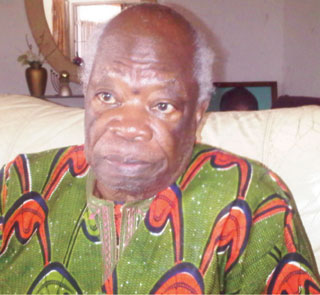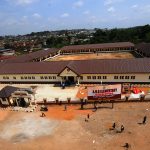
OPINION: Osun School Re-classification Good For State’s Education – Fagbulu
Chief Modupe Fagbulu is a seasoned educationist and retired public servant with the Federal Ministry of Education. He was a consultant to UNESCO, recommended and supervised return of schools to government in 1975 across the country. In this interview with Correspondent Gbenga Faturoti, Fagbulu speaks on re-classification and merger of public schools in Osun State and its effects on the people and students. Excerpts:

Recently, the government in Osun State introduced the education policy of re-classification and merger. What is your take on that?
Well, I’m an ‘education man’ and I am in a very good position to accept what the Osun State government is doing. I will show you something. The essence of the merging of schools is how to make the schools bigger and more efficient. I’m not hiding anything and I have told you earlier how I merged schools in Ijebu-Ode. It is a good decision for any government to implement. It is very tactical but has wonderful results if it is properly done and I have no reason to think that it is not properly done in Osun state.
Some say the religious implication of re-classification and merger of schools were not properly looked into; do you share the same view?
On the issue of re-classification, if you have N10 in your left pocket and you have N10 in your right pocket, for convenience, you may want to put them in one pocket. That is what I term re-ordering, which is the same as re-classification but the total amount of money you have is still the same. Re-classification does not necessarily mean re-structuring or changing. It’s like rearranging something together for the purpose of convenience and efficiency and to suit the situation on ground. Re-classification is not a problem really. The consequences are what we are talking about. When you put schools together, you get something different and that is where change takes place. People are objecting based on the religious background, gender and antecedents of these schools.
Firstly, we used to criticise the British as to why they segregate men and women in the past. It is even better for boys and girls to learn together. There is something that happened when I was about eight to nine years old, which I will never forget until I die. There was a girl in my class who used to beat me in class, and that pushed me to try to beat her at all cost. If that can remain in my mind for 50 years, you can see what it was. It can even be a spur, a challenge or an inspiration to one to ensure that a boy or a girl does not do better than the other. People do not want to see this aspect of it being a challenge to study harder but they are looking at the other side that it can cause distraction; they are talking rubbish. These children will still meet members of the opposite sex right outside the gate of the school, so why separate them when it comes to learning. If you bring up your child properly and emphasise the issue of morality, you shouldn’t be worried about co-education. The foundation should be laid right from the church, the mosque, and the community should instill morals into the children so that the point of immorality does not arise, but if they don’t, the problem of immorality will come up even when they learn separately.
Now on religion, schools do not belong to Christians or Muslims. Any school that receives a kobo from the government, not only here in Osun State, does not belong to any church or any religion at all. Schools belong to the people and the moment public money is spent on the school, it can no longer be denominational. It is against the constitution. You cannot discriminate against one religion or the other. If you want to start your own school, the permission is there; go and start your own school and spend every kobo of your money on it. If it is your school, you can do whatever you like there. Any school where public money is spent is a public school meant for all irrespective of tribe or religion. And it is government policy that every child in the state has a right to education in any of these schools and cannot be stopped on the grounds of religion.
I was the one who started the movement that the schools should be returned to the government. A school has the right to be on its own and run on its own provided that you meet the conditions, you can stay autonomous. The inspectorate was there and they were doing their work before the government took these schools. They knew the instructions, that if you go to a school, this is what you inspect and report to the government, and if the government comes and finds out that the school is lacking in facilities like toilets, the government can take it over. If your school is built for three years, after three years, we come and inspect it and if it meets our standards, we begin to give you grants and we recommend you to start taking the West African Certificate Examinations. Now this people start schools and they come and start begging for grants even when they have not met these conditions. One of the conditions is that you can’t start a school unless that property is guaranteed to remain a perpetuity forever. You must have perpetuity. So when people come for permission to start a school, the first warning is that the property is in perpetuity, meaning you can’t get up tomorrow and decide that you want to sell it. It is a school forever. Then we can give you grants.
Has that changed?
Now this was done for many years and most of the schools were taking grants. After about 50 years, the government comes to take over the schools and they are asking why the government wants to take over the schools and they started asking for compensation. So we asked them to calculate what was used to build the school and what was spent on the school for the three years before the government took over, and we asked them to deduct it from all the school fees taken from the students and the total grants they have been given over the years. After the calculation, they were owing government, so many of them kept quiet.
What was the main reason for taking over the schools by the government?
The major reason why we took over the schools was that we found that the missions were charging the students high fees despite the money they were being given by the government to support the running of the school and they were still saying that the money was not enough. They were enjoying the rest of the money. We have a school near Ikare run by an Italian as well as two other schools, these three schools had excesses. They said the money was more than enough for the running of the school. So we tried to look at the budget of the other schools because they were asking for a review of the money, saying that it was not enough. These other schools were expanding and building new blocks. They said that the money was more than enough, while some were asking for more and they were not even paying their teachers’ salary. When the teachers went on strike, a committee was set up to look into the case of the teachers.
How was the issue resolved?
We ordered that they should pay the teachers but if they can’t do it, are we going to get up to pay the teachers? It was there that another commission was set up to look into how it can be done, and it was not just for one state, it was the whole Nigeria. We discovered that they were also not being fair and just with promotions and other benefits on the basis of religion. So we decided that instead of wasting money, it was best for the government to take over the schools. In 1986, I had to leave for my doctorate and another person was appointed to take my place when I left. So that is why we took over the schools; because the religious bodies were not meeting expectations, because we needed to make sure that the teachers get paid their salaries, because we needed to reduce the cost of education and to stop the injustice and unfairness over promotions and other benefits. We entered to stop the mismanagement of funds. They were misbehaving because they felt that they had the right to do what they like with their school, and we decided that the whole thing would stop when the school no longer belonged to them.
Why were the names of those schools retained after the takeover? It possibly gave these bodies the impression that they were still in charge of the schools?
No government which is serious will waste time over the changing of the names of schools. It is of no consequence to us. The teachers were still the same; just that the ownership had changed. Also for the sake of statistics, changing the name of a school that has been registered for over a long time under a particular name would have been complex and could have created confusion for the community and the students.
But do you think what Osun State government is right?
Osun State is not doing something innovative in education. Osun State is doing what is right in education. Don’t get it wrong. Osun State is on the right track. Innovation is what he is doing in the schools but the building is not innovation. It is the right thing to do. That is my opinion. Innovation means something that has not been done before, something original and brand new. By law, the government can put any gender in any school. The government is not restricted by any section of the constitution. The reactions and protests are not relevant at all. The government is trying to sensitise and educate these people on the right thing to do.
Now again on religion, no religious body has any school, which is funded by public money. Now I will take St. Margaret as an example. My father was one of the founders of that school and my sister is even one of the foundation members. Even one of the houses in the school; Fagbenro House, was named after my father. That means I should have a stake there considering all these. But even there and other schools, there must be a provision for Christian religion teachers as well as Islam religion teachers, and they are never to force the students to attend any outside their wall. If you go to Lagos some of the most notable and rich families have children who went to these schools. I have a friend, Durotimi, who went to Lagos Grammar School and at the School Certificate Examinations, he took Christian religious Studies and passed it. After obtaining his degree, he went to St. Andrews in Oyo, a citadel of Christian education in Nigeria to teach. So religion is not and should not be made an issue. I know him personally so I am using that as an example. Going to either Christian or Muslim school is not an issue because it has nothing to do with your religion. You still have your freedom of religion. As far as I’m concerned, Osun State is doing the right thing.
Before now the system education was 6-6-4 and then the Federal Government changed it to 9-3-4 but with the reclassification here in Osun, it is now 4-5-3-4 structure of education. What is the significance of this?
When the Federal Government changed the structure to 9-3-4, why did all these reactions not come up? This re-classification now split the nine years into four and five years and they are complaining. The nine years is still termed basic education and that is what it is. As regards the names, I will advise the government to let them keep their names, whatever it means to them. If I want to marry a woman, who has a son or daughter who is coming to stay in my house, that child will bear my name so long as I am the one to take care of that child. If they remove all the children from Baptist School and take them to Ahmadiyya, they are now students of Ahmadiyya so long as that is the building they are using. It is not a matter of morality, but a simple case of equity and common sense. Let me give you a good example because I am a teacher. If we have Kolawole School and we have Kolapo School, and you take all the children from Kolapo to Kolawole School, you cannot refer to them as Kolapo anymore because they are now in Kolawole School. If you want those children to retain the names of the schools they are coming from, then in Kolawole School, you will be having children from Kolawole School as well as children from Kolapo School. Is that not stupid? You can only alter the name when you bring boys to girls’ school. It becomes Baptist Middle School, no more Baptist Girls High School, because it is no longer a girls’ school.
Now, we have the nursery, primary and secondary school in other states and even Federal Government schools in this state still go with the same structure. But in Osun we now have Basic, Middle and High schools, any implication?
There is nothing wrong with that because the Osun State government has been careful enough to state the age range for each of them, so when the Federal Government asks for the statistics for any grade, Osun State knows the equivalent. What is important is that the grades and the age range are well known and clearly stated. If you look at the education system we have what we call the age profile and if you look at a class statistics, you can tell the average age for that class. If the average age for a grade is eight to nine years old in a school of 100, 50 can be eight years, 10 may be seven year olds and two six-year olds. There might be 20 nine-year olds. It does not mean that they are the only age in the school, there will be a few above and a few below. Osun State has been very careful to state the age range for every grade and I think they are on the right track.
From the look of things, people are not very receptive to this whole idea of re-classification or merger of schools?
I want to assure you that I have no input in what Osun State government is doing. I have education background and experience in Osun State but presently I am not a contributor.
You have talked of the computer tablet called ‘Opon Imo’ and many schools of thought welcomed the idea but some argued that the study of Ifa was included in it and that it might affect the morals of these students and introduce them to idolatry, what is your take?
My name is Ifagbulu. I think we are over-educated and we now take our roots for granted. I have seen the “Opon Imo” but I have not thoroughly looked at it. What is wrong with the study of Ifa? I believe the “Opon Imo” also has the Bible and the Koran, so why the emphasis on Ifa? If anybody wants to learn, let him have education. Let them know about Ifa, the Koran as well as the Bible. These people need to be enlightened in order to objectively assess, criticise and speak about other religions apart from theirs. I am not going into a religious fight with anybody because we are talking of education. I have read the Bible and the Koran and sometimes I ask myself why these people are fighting themselves. Are they crazy? The only thing that differs is that Muslims don’t call Jesus. A lot of things in the Bible are in the Koran, so what are we arguing about? I have a Bible as well as a Koran.
Let them put the Bible, Koran, study of Ifa and everything in the “Opon Imo”. Why can’t we know about our past? If they don’t want to know the past, then there is no point studying history. Let them tell us what is particularly wrong with Ifa. It is all part of knowledge.
DAILY INDEPENDENT



